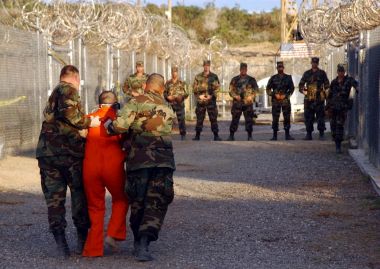Shaker Aamer, Guantanamo and why it took 13 years to get him out

Is the Guantanamo Bay fiasco the greatest stain on Western justice for a generation?
There are so many candidates, but on the whole, I'd say probably yes. The entire panoply of the American legal system was arrayed in order to support the incarceration of men who had never been tried or convicted of any crime. It was right, the world was told, because they were the enemy.
That's putting it at its most simplistic, but sometimes simple is good. It cuts through the fog of obfuscation and self-justification that has been generated to obscure the truth.
Detainees began arriving at Guantanamo Bay in 2002, at the height of the outrage followng the 9/11 attacks. It has housed 779 men, of whom more than 100 still remain. Most of them – around 80 per cent – were captured not on the battlefield but were handed over in exchange for cash by Pakistani and Afghan bounty hunters.
Shaker Aamer, who today became the last British resident to be released from Guantanamo, is one of the many who has consistently denied involvement in any kind of terrorism. He was detained in Afghanistan in 2001 and has spent 13 years in Guantanamo. He was never charged with any crime. Successive British governments have raised his case – not very forcefully – and he was actually clear for release in 2007. It has taken this long for him to be freed.
Accounts of the treatment of Guantanamo detainees are sickening. They were tortured, including being waterboarded – a simulation of drowning. Force-feeding, beatings and psychological torment were common. Writing in the New York Times on June 24, 2012, former US President Jimmy Carter said: "...some of the few being tried (only in military courts) have been tortured by waterboarding more than 100 times or intimidated with semiautomatic weapons, power drills or threats to sexually assault their mothers. These facts cannot be used as a defence by the accused, because the government claims they occurred under the cover of 'national security'".
There have been at least six suicides and 41 attempts made by 25 detainees.
Shaker Aamer himself is thought to be suffering from post-traumatic stress disorder, like many released detainees. He was detained on the same day his son was born and has never seen him.
How did it come to this?
The answer is depressingly clear, but thoroughly biblical: it's human sinfulness.
The people who set up, ran and justified Guantanamo Bay turned their backs not just on the established principles of American justice, but on something far more fundamental: the truth that every human being is made in the image of God.
They thought – and many of them still think – that some people are so bad that they don't deserve to be treated as human beings. They can be deprived of home and hope, for ever, and it's alright.
The people who did this were angry and afraid, and they wanted to hurt someone. They transferred their anger and fear on to their prisoners. These men, with brown skin, speaking a different language and following a different religion, the enemies – as many of them admitted – of America, became the Enemy. Releasing them would be an admission that the whole scheme was flawed from the beginning.
America's allies, like Britain – so quick to parrot the language of human rights when it is expedient to do so, and so slow when it is not – lacked the courage to confront her. President Obama, who promised at the beginning of his presidency to close Guantanamo down, has so far failed.
Is anyone safer because of Guantanamo? Probably not. Is it the greatest stain on Western justice for a generation? Yes.
Follow @RevMarkWoods on Twitter.











